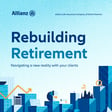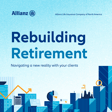
Episode 1.10 Christine Benz on the emotional side of retirement
Christine Benz is the director of personal finance and retirement planning for Morningstar. Her new book, "How to Retire: 20 Lessons for a Happy, Successful, and Wealthy Retirement," explores the financial and softer emotional side of retirement.
Christine talks about retirement portfolio planning and different income styles for the decumulation phase, the need to think of retirement as a series of stages and not as a hard stop, and how financial professionals can incorporate purpose and values into their conversations with clients.
Go to the Morningstar website to learn more about Christine’s book
See more retirement risk management insights from Allianz
...
Allianz Life Insurance Company of North America (Allianz) and Allianz Life Financial Services, LLC are not affiliated with our podcast guests or their companies. Any links to the podcast guest's website are being provided as a service to you. Opinions expressed by the podcast guests are not necessarily those of Allianz or its affiliates. Please note that the information and opinions are provided by third parties and sources believed to be reliable, but accuracy and completeness cannot be guaranteed. The information is not intended to be used as the sole basis for financial decisions, nor should it be construed as advice designed to meet the particular needs of an individual’s situation.
Allianz Life Insurance Company of North America has been keeping its promises since 1896 by helping Americans achieve their retirement income and protection goals with a variety of annuity and life insurance products.
Annuities can help you meet your long-term retirement goals by offering tax-deferred growth potential, a death benefit during the accumulation phase, and a guaranteed stream of income at retirement.
Allianz Life Insurance Company of North America (Allianz) does not provide financial planning services.
This content is for general educational purposes only. It is not intended to provide fiduciary, tax, or legal advice and cannot be used to avoid tax penalties; nor is it intended to market, promote, or recommend any tax plan or arrangement. Allianz Life Insurance Company of North America, its affiliates, and their employees and representatives do not give legal or tax advice or advice related to Social Security or Medicare. Customers are encouraged to consult with their own legal, tax, and financial professionals for specific advice or product recommendations, or the Social Security Administration (SSA) office for their particular situation.
Guarantees are backed by the financial strength and claims-paying ability of Allianz Life Insurance Company of North America. Registered index-linked annuity (RILA) guarantees do not apply to the performance of the variable subaccounts, which will fluctuate with market conditions.
Products are issued by Allianz Life Insurance Company of North America. Registered index-linked annuities (RILAs) are distributed by its affiliate, Allianz Life Financial Services, LLC, member FINRA, 5701 Golden Hills Drive, Minneapolis, MN 55416-1297. 800.542.5427 www.allianzlife.com
This content does not apply in the state of New York.
For financial professional use only – not for use with the public.

